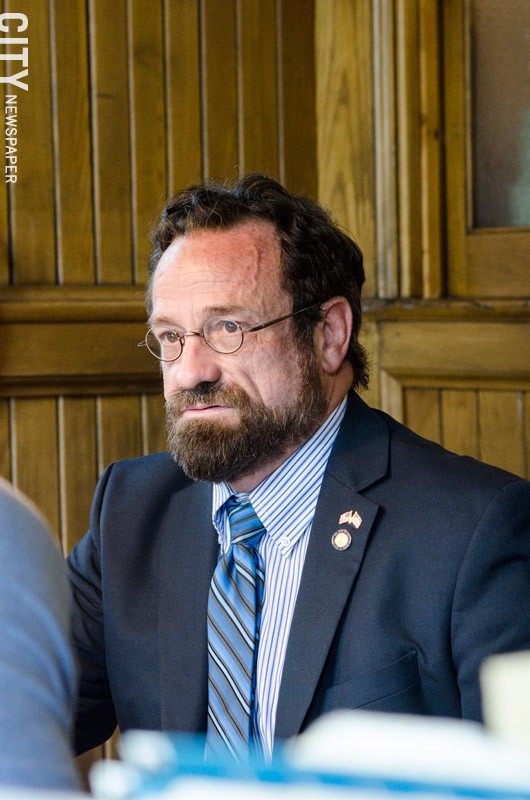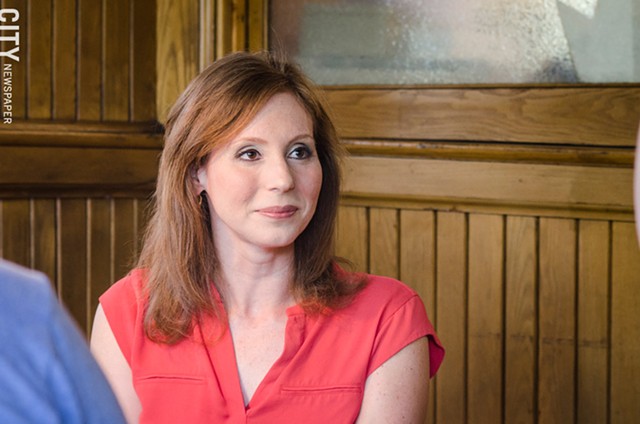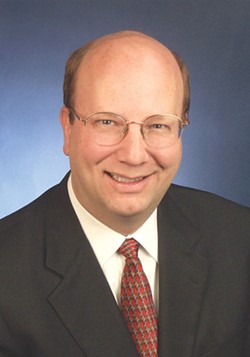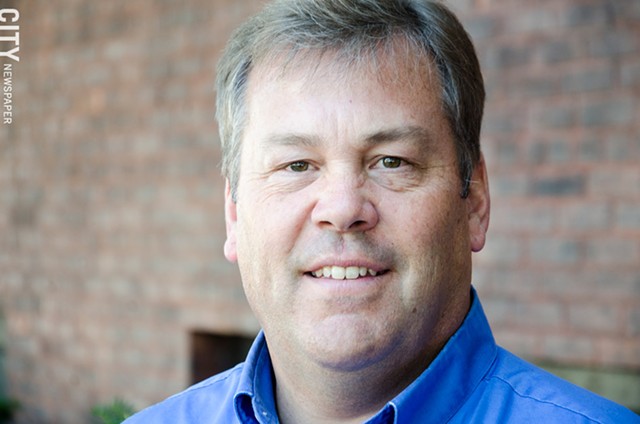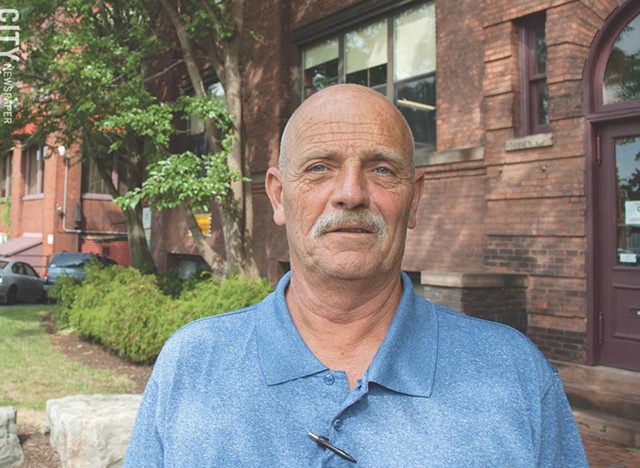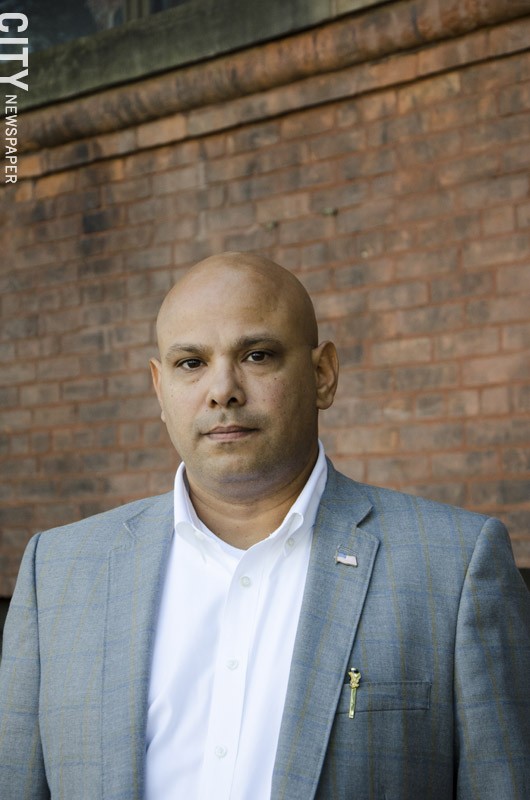
[
{
"name": "500x250 Ad",
"insertPoint": "5",
"component": "15667920",
"parentWrapperClass": "",
"requiredCountToDisplay": "1"
}
]
The low-key Harry Bronson is probably never going to set the world on fire. Rachel Barnhart, on the other hand, is a serial arsonist, drawing and demanding attention almost everywhere she goes. But while their styles are opposed, they are probably less than a hair's width apart on the issues. The two are waging a closely watched primary election battle for State Assembly.
Bronson is an attorney and the incumbent. Barnhart was a well-known news anchor and reporter — and she's still a star on social media — who let her contract with WROC channel 8 expire at the end of May so that she could challenge Bronson. The September 13 primary will determine which candidate gets the right to represent the party in November's general election.
CITY is endorsing Bronson in this race because of his record, his reputation, his depth, and his grasp of both the legislative process and the issues that are critical to the 138th Assembly District, which includes some city neighborhoods as well as the towns of Henrietta and Chili.
Barnhart is a forceful challenger who knows how to craft a message and get it out; she's clearly learned a lot during her 17 years in Rochester TV journalism. And the message she's sending right now is that Bronson hasn't done enough during his time in office; he's the invisible man, she says.
"He talks a lot about minimum wage, paid family leave, marriage equality; those are all wonderful things that I would have actively supported along with him, but they weren't his bills," Barnhart says.
She also says that Bronson is unwilling to challenge the governor or legislative leadership, that many of his constituents don't know him, and that he's not engaged. These are all standard attacks for someone challenging a sitting state legislator. And in this case, they are wrong.
Sure, Bronson's name wasn't at the top of big bills implementing paid family leave, legalizing same-sex marriage, or raising the minimum wage, but so what? His work on each of those issues dates back to well before he was elected to the Assembly; who gets credit for a bill is about the last thing a lawmaker should worry about.
"He's behind the scenes," says Bess Watts, a well-known local LGBTQ activist and union leader. "He does the work."
When the Assembly took up minimum wage this year, Fight for $15 representatives asked Bronson to help convince other legislators to vote for the increase, which he did.
He spent at least 10 years working with advocates to advance paid family leave, and when it was included in this year's budget, he joined other rank-and-file members to press the governor and Assembly leaders to make sure it stayed there.
And on marriage equality, he spent a lot of time talking to people outside of the LGBTQ community, building support for legislation.
The bottom line is that Bronson outguns Barnhart on knowledge of policy, of issues, of legislative process, and of the finer points of legislative negotiation. Of course, when you have Bronson's experience, which also includes a stint as an Assembly staff attorney, you're naturally going to have an edge on a rookie opponent.
But when Barnhart calls Bronson a "behind the scenes" legislator, it's not a compliment. Bronson's knowledge of process and skill at negotiating have earned him respect and a reputation as someone who people can work with. Those aren't qualities to be used as a weapon against him, which is what Barnhart is doing.
Barnhart says that she'll be a watchdog legislator who will push back against power. She'll ask tough questions, and her audience, including her large following on social media, will help ensure that leaders listen to her.
"Do you think I'm going to have a problem with anyone listening to me?" she says. "I don't think so."
Even though Barnhart says that she can work with people and that she's "not going to go to Albany to be some sort of a tornado," that is the impression that she gives off. The district doesn't need a rock star, it needs a worker. Maybe Barnhart can be both. But with Bronson, you know you're getting the latter — and that's what matters.
The candidates agree on most of the big issues. They're both concerned about the growing number of charter schools and the lack of oversight around them, for example. They both want to see changes to the state's teacher evaluation rules. They agree that climate change is a problem that the state should act on. And they both support the SAFE Act.
Where they don't agree is on state economic development programs, particularly START-UP NY, which Barnhart says is "a complete failure." Under START-UP, companies tie in with one of the state's public or private universities, and for 10 years, neither the business nor its employees pay state taxes. But Barnhart says it, and some other state job-creation programs, throw money at companies without getting a significant number of new jobs in return.
Bronson says that he has doubts about START-UP NY, but that it's had some important successes in the Rochester area. The program helped convince Datto, a cloud-based data storage and disaster recovery provider, to open an office in downtown Rochester, for example. The company had 60 employees at the start of the year, and has outgrown its current space in an RIT-owned building on Franklin Street.
Bronson says that he wants to see a better accounting of what the state spends on the program. He wants to if state investments have paid off, and how much the companies are putting in, he says.
Bess Watts says that it was Bronson who got her and her wife, Anne Tischer, involved in activism. The couple had been speaking at County Legislature meetings, trying to get domestic partner benefits for county employees. Bronson, who was a county legislator at the time and is openly gay, approached them.
Even then, Bronson spent a lot of time talking with people one on one about the importance of equal marriage, Watts says. He also readily accepted invitations to serve on panels and to speak to groups about the issue.
In 2009, before Bronson was elected to the Assembly, marriage equality suffered a disheartening defeat in the State Senate. The Assembly and Senate took up marriage equality again in 2011, and Bronson worked to mobilize supporters in his district, and to convince Republican State Senator Jim Alesi, who delivered a pained "no" vote the last time, to change his mind. That year, the marriage equality bill passed, 33 to 29. (Alesi voted in favor.)
Bronson's record has many stories like this; it's a testament to the pivotal role that fundamental advocacy plays in passing big pieces of legislation.
"The claims of me not being involved have a premise that suggests if you're not the prime sponsor of a bill, somehow you have nothing to do with that bill, which lacks an understanding of what the process is all about," he says. "If you have to be a sponsor of every single bill that happens, then a new member in the Legislature will have absolutely nothing to do because most bills, especially high-profile bills, go to the chairs."
Bronson also sponsored some unsexy, but important legislation. One of those bills, which was voted into law, required continuing education and certification for people who sterilize increasingly complex surgical equipment. The sterile processing law was sought by a professional association, and involved a back and forth between Bronson's office, hospitals, and unions.
Bronson also drafted and pushed for a law giving judges greater discretion to waive public notification requirements for legal name changes. The bill passed, and though its original intention was to protect people transitioning genders, it also has value for victims of domestic violence and victims of crimes such as stalking.
During this year's budget negotiations, Bronson teamed up with Assembly members from other Upstate cities to push changes in budget language on struggling schools. If left in its original state, the budget would have undermined a turnaround effort at East High School, Bronson says, which involves a partnership between the city school district and the University of Rochester. (Bronson and Barnhart both support the partnership and say that it should be replicated if successful. Barnhart expresses some concerns over the cost, though.)
Within the past year, former Assembly Speaker Sheldon Silver and former Senate Majority Leader Dean Skelos were convicted on corruption charges, and both face jail time. The scandals fueled debates about ethics reform in Albany, particularly concerning outside income for legislators, who are considered part-time under state law.
But the outside income limits became a sticking point that helped doom the broader ethics packages introduced this year. Legislation curbing independent political expenditures did pass, as did a constitutional amendment requiring elected officials convicted of corruption charges to forfeit their pensions. The next Legislature will have to pass the amendment, and the public will have to vote in favor in order for it to become law.
Bronson supported the bills on independent expenditures and pension-stripping, and says that he's frustrated that the Legislature didn't pass broader ethics laws. He co-sponsors a bill to close the LLC loophole; companies can currently skirt campaign contribution limits by funneling money through various affiliated LLC's. He also co-sponsors a public campaign finance bill. The Assembly passed both pieces of legislation, but the Senate's Republican majority blocked them.
"It's fair to say that there are still things to be done," Bronson says. "It's not fair to say the Assembly is holding it up."
Barnhart supports limiting outside income for legislators and closing the LLC loophole. She says that she also leans toward public financing of campaigns. And she faults Bronson for not pressing legislative leadership hard enough on this year's ethics bills. Challengers often make this sort of attack on sitting legislators, or cast the incumbents as a cog in a broken machine.
But voters tend to shrug off this line of attack, although this year might be different given the high-profile convictions of Silver and Skelos.
Barnhart deserves credit for her emphasis on transit, a topic that often isn't even mentioned by candidates. Even as a reporter, she was an unabashed advocate of city living, of walkable, bikeable neighborhoods, and of public transit. She serves on the board of Reconnect Rochester, an organization which champions those causes.
She says that she'd like to get more funding for the Rochester Genesee Regional Transit Authority, so it can improve its system. The authority has cut several routes that it says were no longer financially sustainable.
"Transit riders are taxpayers; I think we forget about that," Barnhart says. "And I think we forget that our roads are subsidized, too. The gas tax doesn't pay for all the roads."
Public transportation has strong potential to bolster local job-creation and poverty-reduction efforts, Barnhart says. But state and local governments often don't make it an issue when they provide incentives to businesses, she says. The governments should ask companies how they plan to get employees to their workplaces, and they should use the incentives to nudge the companies toward locating on bus lines, she says.
Barnhart also criticizes Bronson and state lawmakers for leaving Albany this year without passing legislation to allow ridesharing services such as Uber and Lyft; the first Uber bills were introduced in 2015. It's what the public wants, and there has to be a way to reach a compromise with the taxi industry so it can happen, she says.
She emphasizes other important issues in her campaign, too.
The state and local governments should step up their efforts to expand fiber optic internet connections to homes and businesses, she says. For example, Monroe County has a vast fiber network with lots of extra capacity, and it could allow broadband providers to tap into the network under the condition that they provide a basic, affordable option to all of the households that they serve, Barnhart says.
The state should also give funding for providers to build out fiber connections, with similar conditions, she says.
She also says that the state should fully legalize marijuana. The prohibition on pot has led to more crime on city streets and mass incarceration of young black men, Barnhart says.
Bronson could take a lesson from Barnhart on communication.
Barnhart has cultivated a large social media following, particularly on Twitter, and has made her visibility and accessibility a central part of her campaign. She also lays out a digital-age approach to representation which, while not exactly new to the world of politics, hasn't been embraced by many Rochester-area politicians.
Bronson has a reputation as an accessible and responsive leader, but he could do more with social media, which serves as an information gateway for many people, if not their main source of information. Social media also provides a conduit for easy back and forth with constituents.
We're not saying that Bronson needs to be on Kik, but his profile could use a bump. The old days of sending a press release into the ether and waiting for the media to call are over.
Otherwise, Bronson is the best choice to represent Democrats in the 138th Assembly District. He knows the area, he works hard for the people in it and the organizations serving it, and he's shown that he knows how to get things done in the crowded, often chaotic capital.
"I strongly believe that my role as a state legislator is to look out for the interests of the people I serve and to make sure that they have every possible opportunity to fulfill whatever their dreams are," Bronson says. "That's why I do this and that's why I work so hard at it."
Don't forget about the Republicans
Harry Bronson and Rachel Barnhart better save some energy for after the primary. Whoever wins their Assembly race will have to defeat one of two Republican challengers in the November general election to take the 138th District seat. Bob Zinck and Peter Vazquez, both of Henrietta, are fighting for the GOP ballot line.
There's another GOP primary, too: a contest for the 133th Assembly seat between controversial Conservative icon Bill Nojay, the incumbent, and Rick Milne, the mayor of Honeoye Falls. The winner will face Democrat Barbara Baer in the general election, although Nojay goes on no matter what since he also has the Conservative Party's endorsement.
The GOP candidates in the two races have a lot in common. They all say that business is best served when government gets out of the way, and that the state needs to cut regulations and end bureaucratic delays that make it difficult for businesses, nonprofits, and local governments to operate.
They also say that the state pushes too many requirements on local and county governments without providing funding to meet them. They want to see more local control over education and fewer state requirements for things such as high-stakes testing; they also say that charter schools can be a good option for some families. And they all oppose the state's SAFE Act gun control law to some degree, particularly because it was rushed through the Legislature.
None of this is new. Republicans across New York have pushed these points for years, though it's debatable whether sitting legislators have made a real effort to address them.
The 133rd District covers Rush, Wheatland, Mendon, and Pittsford — including the villages of Pittsford, Honeoye Falls, and Scottsville — as well as all of Livingston County and several communities in Steuben County.
Nojay, an attorney who hosts an hour-long radio talk show every weekday on WYSL, has the backing of Republican committees in all three counties within the district. He would only agree to answer CITY's question via email.
Nojay's narrative contrasts with the one often given by other lawmakers on both sides of the aisle: Upstate's economy isn't on the upswing; in fact, it's falling behind, he says. People are leaving for jobs in other states, and roads, bridges, public water systems, and sewers are crumbling, Nojay says.
He blames state policies and regulations. For example, he calls the state's various economic development programs "a combination of pay-to-play linkages between campaign coffers and the government cash trough, corporate cronyism, public relations opportunities for politicians, and wasteful spending." He'd prefer policies that lower taxes and energy costs, and eliminate regulatory burdens on businesses, Nojay says.
"I've been honest with people about what we need to do, and have spoken out about the need for change even if it is politically unpopular," he says.
Nojay is a high-profile opponent of New York's gun control laws, and was a plaintiff in the New York Rifle and Pistol Association's lawsuit, which sought to overturn the SAFE Act. "It is a political law, enacted so the governor can claim to have taken action in the wake of the shootings in [Connecticut]," he says.
A federal court ruled against the association and the group chose not to pursue a Supreme Court challenge.
The state should look to other areas for crime prevention, including sentencing reform, rehabilitation programs, and job training, Nojay says. He also wants the state to provide more resources for mental health diagnosis and treatment; he's working on the issue with Republicans and Democrats through his post on the Assembly's Mental Health Committee, he says.
Milne's tone is more moderate. For example, he says that state economic development programs are important, but that the resources aren't spread around as much as they should be. He uses this year's $100 million downtown revitalization initiative as an example. The state provided a $10 million award for one downtown in each of its 10 Regional Economic Development Council areas; in the Finger Lakes region the money went to the City of Geneva.
Geneva deserves kudos for winning the award, Milne says. Honeoye Falls or Livonia may not have needed that much money, but if the state also steered $50,000 or $100,000 to those communities, they could do a lot with it, he says.
Milne bases much of his pitch around his experience as Honeoye Falls' mayor. He's developed several budgets under the statewide property tax cap and says that the intent of the cap is generally good. But the state imposed it without boosting municipal aid or much-needed road and infrastructure funding, which has put increasing pressure on local budgets, he says.
He says that he was convinced to run for Assembly because residents and elected officials in the district repeatedly told him that Nojay isn't engaging or representing them. Milne says that, if elected, he won't wait for people to contact him to set up meetings; when he's not in Albany, he'll reach out to elected officials, businesses, and community groups, he says.
"I think we need a stronger voice that is a common voice, a voice together," Milne says. "We all have our differences, but we all have to figure out projects in areas that we can work on together."
Milne is a member of the National Rifle Association, a gun owner, and an avid hunter. And like Nojay, he doesn't see much value in the SAFE Act. He'd prefer to see more emphasis on helping law enforcement get illegal guns off the street and making sure that people who shouldn't own guns do not own them, he says.
Milne says that he wants to see more scientific information on climate change, but that the state should help advance technologies and industries that can help keep the planet clean. Nojay is dismissive of climate change and the state's efforts to address it. The state has lost the balance between protecting air, water, and soil, and growing the economy, he says.
The 138th District covers part of the City of Rochester and all of the towns of Henrietta and Chili.
Zinck, who is the county GOP's endorsed candidate, is co-owner of Lovin' Cup, a popular restaurant and music venue next to RIT in Henrietta. He also has a long resume in government: he's a former county legislator, former State Workers' Compensation Board member, and former commissioner of the Rochester-Monroe County Youth Bureau.
He says that he can't be all things to all people, and would focus on a few specific areas as an Assembly member, such as youth development programs. His background makes him a good advocate for afterschool programs, for example, he says.
"The state has been shortsighted in reducing funding for positive youth development programs," Zinck says. "You wonder why kids are ending up in facilities, well, if you take away all the funding that stresses the positives, kids are going to be left to their own devices and they're going to get in trouble."
Like other Republicans, he says that the state's regulatory and bureaucratic structures make it difficult for businesses to start or operate. As a legislator, he can help businesses in his district navigate those systems, he says.
Zinck says that the state needs to make more funding available for addiction treatment, given the heroin and opioid problem facing New York communities. If someone wants help but can't get immediate access to treatment, they'll probably continue to use, he says.
Vazquez, who founded a process-serving business and serves as president of the conservative Frederick Douglass Foundation, is making his third run at the Assembly seat. He lost to Democrat Harry Bronson in his previous two attempts.
Vazquez is running as an anti-establishment Republican candidate, and is calling for Monroe County GOP chair Bill Reilich to step down "for the good of the party and the community." Reilich and other state Republican leaders compromise on harmful Democratic proposals too often, and don't support candidates who might speak out against them, Vazquez says.
Albany has a problem with corruption and backroom deals, and the problem starts at the local levels because office-holders won't question or buck leadership, Vazquez says. The GOP's platform won't advance until that dynamic changes, he says.
"No one's stepping out and saying 'We've got issues here' and challenging that authority," he says.
His positions generally concern government overreach. He uses the state's inaction on ride-sharing and the way that it's handled professional mixed martial arts as examples.
Uber and similar companies can't operate in New York because the state's laws don't allow ride-sharing services to get insurance to cover their drivers and riders. Some critics are also concerned that the service would harm the taxi industry. Through its failure to change the laws, the Legislature is standing in the way of business competition and job opportunities for state residents, Vazquez says. Allowing ride-sharing would also force taxi businesses to improve their service, he says.
As for MMA, the state legalized it, but with onerous tax and insurance requirements, he says.
Casinos are a contentious issue in the 138th District. Henrietta residents fought a proposed Seneca Nation of Indians casino in their town, and the Seneca Nation ultimately backed away. A Seneca casino has also been proposed as a possible use for a vacant parcel at the Midtown site in downtown Rochester.
Zinck is open to a casino downtown if it would stimulate growth, but his support depends on what his constituents want, he says.
Vazquez says that he doesn't have an issue with gaming generally, but that a casino would just suck money out of downtown. There are enough casinos in New York already, he says.
Zinck pushes back on Vazquez's insistence that Reilich must step down. To accomplish anything in Albany, you have to be able to get along with people, he says. But Vazquez has turned off some party members by attacking the leadership, he says.
Vazquez is not going to have a lot of luck in Albany if he can't get along with people, Zinck says.
CITY is not endorsing in the Republican primaries.
